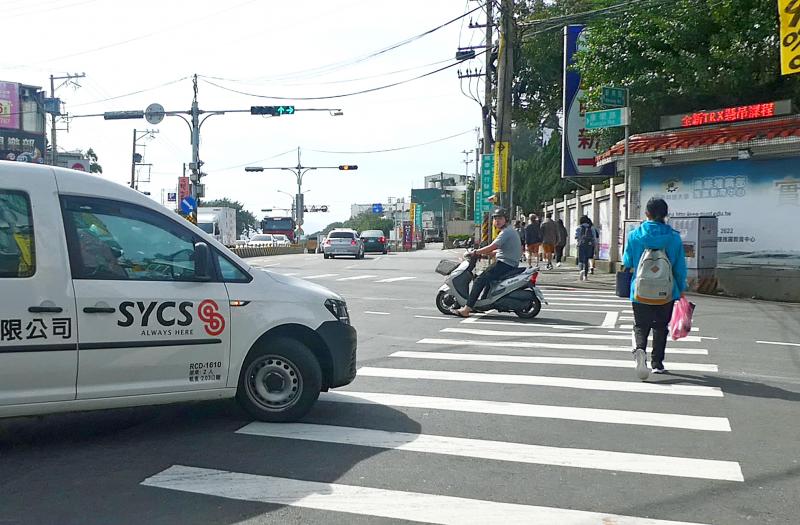To improve pedestrian safety, a set of draft amendments to the Road Traffic Management and Penalty Act was passed during a Ministry of Transportation and Communications (MOTC) review board meeting on Jan. 28.
Pedestrians have absolute right of way when walking on a crosswalk, but accidents still happen from time to time that involve injuries or even deaths caused by vehicles not stopping or giving way to pedestrians. Minister of Transportation and Communications Lin Chia-lung said that the MOTC hopes to make traffic more human-oriented, and cars and motorcycles should give way to pedestrians at intersections. It has long been said that vehicles should “politely“ give way to pedestrians, but in fact vehicles should always stop to let pedestrians go first unless there is a “no pedestrians“ sign.
Lin asked for the reform to start from the three aspects of “people, vehicles and roads” by enforcing the law that demands yielding to pedestrians at intersections, reviewing road design specifications, and planning to increase penalties, so as to increase drivers’ awareness of the need to give way to pedestrians.

Photo: Liao Hsueh-ju, Liberty Times 照片:自由時報記者廖雪茹
Regarding the increase in fines, the amendment refers to the laws of the US, Japan, France and South Korea. Drivers who do not allow pedestrians to pass first will be fined NT$1,200 to NT$6,000, increased from the current NT$1,200 to NT$3,600. Those who cause injury or death will bear both civil and criminal liability as well as facing a fine of NT$7,200 to NT$36,000.
Having been passed at the MOTC review board meeting, the draft amendments will now be transferred to the Legislative Yuan for review.
(Translated by Lin Lee-kai, Taipei Times)
為強化行人安全,交通部一月二十八日部務會報通過「道路交通管理處罰條例」修正案。
行人走在行人穿越道上擁有絕對通行權,但車輛因未停讓行人導致的傷亡事故仍時有耳聞。交通部長林佳龍表示,交通部希望落實人本交通,所以在路口汽機車應當禮讓行人;過去都是說「禮讓」,但事實上依法規範的話,如果沒有禁止行人標誌,就應該優先停讓。
林佳龍要求從人、車、路三方項著手,推動路口停讓行人大執法、檢討道路設計規範、規劃加重處罰等方式,來提醒車輛要停讓行人。
在提高罰鍰方面,參考美日法韓法規,未停讓行人先行通過者,罰鍰從現行一千兩百元至三千六百元,提高為一千兩百元至六千元;因而致人受傷或死亡者,除民刑事責任外,還可處七千兩百元至三萬六千元。
「道路交通管理處罰條例」修正草案在交通部務會報上通過後,將報行政院續轉立法院審議。
(自由時報記者鄭瑋奇、陳炳宏)

A: According to reporter Joon Lee’s analysis, what are other reasons why the Los Angeles Dodgers made back baseball superstar Shohei Ohtani’s huge contract so quickly? B: Second, a lot of Japanese and global enterprises are eager to benefit from the “Ohtani effect”. . . A: That’s sure to increase the Dodgers’ bargaining chips in negotiations. B: Lastly, all this media coverage is elevating the Dodgers’ brand to a new level, boosting the value of the franchise. A: I can’t wait to see a battle between Ohtani and “Team Taiwan” at the 2026 World Baseball Classic. A: 根據記者Joon Lee的分析,洛杉磯道奇隊和球星大谷翔平的巨約快速回本還有哪些原因? B: 第二、無數日本和全球企業都想和這股「大谷效應」沾上邊……。 A: 這也增加了道奇在各種商業談判中的籌碼吧。 B: 第三、媒體報導更將道奇的品牌形象推升至全新的高度,使該隊價值水漲船高。 A: 真期待在2026年「世界棒球經典賽」,看到大谷和台灣隊的經典對決! (By Eddy

The subject of placebos has been fascinating scientists and medical professionals for decades. The word placebo comes from Latin and means “I shall please.” The concept of the placebo effect refers to the phenomenon in which treatments or procedures produce positive outcomes merely because individuals believe they will work. __1__ During medicine trials, researchers often include a “placebo group” as a control to measure the true efficacy of the medication being tested. While one group receives actual drugs, the placebo group is given an inert substance, such as a sugar pill. To ensure unbiased results, participants in the placebo

Picture this: contestants are walking gracefully across a stage, competing for the highly desired title of “most beautiful.” However, these participants aren’t fashion models—they’re camels. Welcome to the extraordinary world of the Pushkar Fair, where beauty contests take on an entirely different meaning. The Pushkar Fair is held annually in the small desert town of Pushkar, India, usually in November. It began as a livestock trading event where farmers and herders gathered to buy and sell camels, horses and cattle. Over time, it has grown into a major cultural carnival that attracts thousands of tourists from around the world.

A: Major League Baseball’s 2025 World Series took place last week. The games between the Los Angeles Dodgers and Toronto Blue Jays were so exciting. B: As the highest-paid baseball player in the world, Shohei Ohtani of the Dodgers was an incandescant superstar. A: The Dodgers signed a record-breaking 10-year, US$700 million contract with Ohtani in 2023. As former ESPN reporter Joon Lee analyzed, the team quickly made back all the investment in the player’s first season. B: Wow, how is that possible? A: Firstly, tourism from Japan to Los Angeles has surged by 90 percent since Ohtani signed the deal, with the